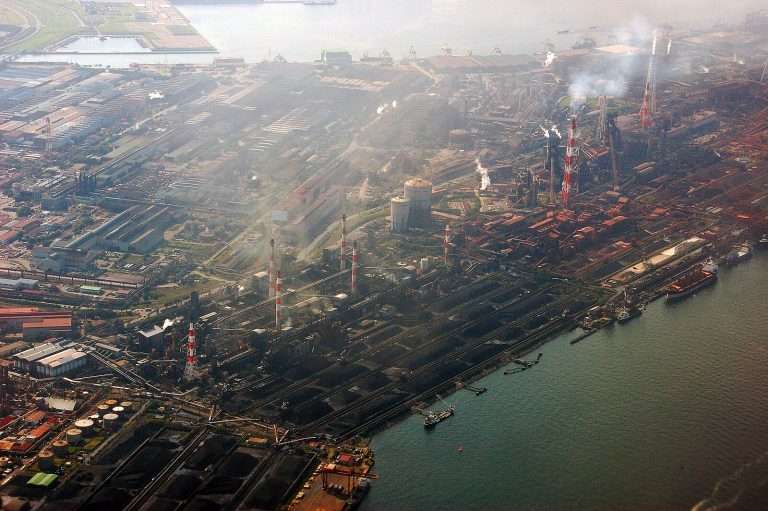Politicians from both parties are eager to block the acquisition, but their reasons for taking this position are problematic.
In early September, Vice President Kamala Harris made known her opinion on Japanese steelmaker Nippon Steel’s pending acquisition of US Steel. The Democratic presidential nominee said that she opposes the deal valued at over $14 billion—which brings her stance in line with that of former President Donald Trump and Senator J.D. Vance, as well as several other lawmakers in both parties. President Joe Biden, for his part, is preparing to block the sale, which has been under review by the interagency Committee on Foreign Investment in the United States (CFIUS). When the news broke on September 4, US Steel share prices plummeted, finishing the day roughly 17 percent lower.
Why the Ruckus over US Steel?
Why is the administration planning to block the acquisition of US Steel? At a Labor Day rally in Pittsburgh, President Biden said the following to raucous applause: “I believe in American steel companies—American-owned and operated steel companies. … United States Steel, an iconic American company for more than a century, is going to remain an American company.”
But being “iconic” and having a storied history should not itself be an excuse for federal interference. Firms that were industry leaders decades ago can wane over time and be superseded by newer, more innovative competitors. This is creative destruction at work, and it is a crucial element of free markets.
When US Steel was formed through a merger in 1901, the United States was the global leader in steel. US Steel led the industry and was at one point the most valuable company in the world and the first to attain a market capitalization of over $1 billion. In recent decades, however, US Steel has fallen behind its competitors, including foreign companies and domestic companies like Nucor, whose minimills use scrap metal (rather than iron ore) as their primary input.
The problems that US Steel faces are numerous: its technology is outdated, capital investment is sorely lacking, its workforce has shrunk, and several projects (including a planned upgrade of its Mon Valley Works plant) have been canceled. These issues arguably have been exacerbated by our nation’s long history of steel protectionism. US Steel today does not even crack the top 500 most valuable companies in the United States, employs far fewer workers than it once did (about 20,000 people, or just 0.15 percent of the American manufacturing workforce), and ranks only 27th in the world in crude steel output (even placing behind American companies Nucor and Cleveland-Cliffs).
Why Blocking the Planned Takeover Would Hurt America
US Steel could do with an influx of capital and technology, and this is why the attempts to impede Nippon Steel’s purchase are particularly troubling. US Steel CEO David Burritt warned that without access to Nippon Steel’s resources including $2.7 billion in additional investment, the company may have to relocate its headquarters from Pittsburgh and shutter steel plants. This would have ramifications for thousands of workers and could impact downstream industries that rely on steel.
As its president Eiji Hashimoto and executive vice president Takahiro Mori explained in the Wall Street Journal, Nippon Steel “will introduce technology to US Steel that allows the company to produce the highest-quality products for automotive, construction and other industries. The new technology will also further the company’s competitiveness, the broader American steel industry, and the many industries that rely on it.” Hashimoto and Mori specifically point out that Nippon Steel “run[s] many of the largest blast furnaces in the world” and could “bring fresh investment and innovation to US Steel’s blast-furnace facilities,” which are comparatively less productive.
But the problems with blocking the deal extend beyond economic efficiency. There are geopolitical costs too. President Biden and his top advisors have argued that the acquisition of an American steel producer by a foreign company could impair US interests. National Economic Advisor Lael Brainard wrote in a statement that the deal “deserve[s] serious scrutiny in terms of its potential impact on national security.”
But it is difficult to see how national security could be imperiled by the sale of US Steel to a Japanese firm. After all, Japan is a major non-NATO ally and a key US partner in the Asia-Pacific. One industry executive, reacting to the news that President Biden plans to block the deal, remarked, “Japan is an ally. We need our friends at a time when geopolitical tensions couldn’t be higher.” The national security rationale is particularly puzzling given that earlier this year President Biden and Japanese Prime Minister Fumio Kishida joined together to “celebrate this new era of US-Japan strategic cooperation” and “pledge[d] … [to] continue our tireless work … to realize a free and open Indo-Pacific and world.” Stymying the deal would undermine the goal of a free, open, and cooperative relationship between the two nations—a relationship which, the White House acknowledges, depends on foreign investment.
Moreover, as Scott Lincicome and Alfredo Carrillo Obregon of the Cato Institute point out, “[t]he Defense Department doesn’t currently buy from US Steel, and DOD needs just 3 percent of domestic steel production to meet its procurement obligations.” Quoting William C. Greenwalt, who previously served in senior Defense Department roles including as deputy undersecretary for industrial policy, they write that “the current steel industry—save a couple mills (not owned by US Steel) that produce defense-grade metals—‘has not only been mostly worthless to national security—it has arguably become detrimental to it’ because of its support for protectionism.”
What This Means for American Politics
All of this invites the question: why do politicians—across partisan lines—seem so eager to make their displeasure with the planned takeover known? The answer may lie in the incentives they face as the 2024 elections approach. Both Donald Trump and Kamala Harris publicized their opposition to the deal at rallies in Pennsylvania, a crucial swing state where the candidates hope to win the allegiances of unions including the powerful United Steelworkers union. This is despite the fact that many workers working in Pennsylvania steel towns like West Mifflin have become unlikely allies of Nippon Steel—notwithstanding union leaders’ firm opposition to the deal.
Policymakers in Washington often fail to appreciate the importance of local knowledge—or in the words of economist F.A. Hayek, “knowledge of the particular circumstances of time and place”—to economic decision making. Along those lines, Delia Lennon-Winstead, the mayor of the Pittsburgh suburb Braddock, rhetorically inquired, “Do [the presidential candidates] actually walk these streets and live in this area?” Likewise, West Mifflin Mayor Chris Kelly said, “I would bet that none of the national politicians have seen what I’ve seen and have not talked to these local workers.” Politicians’ desire to intervene in the US Steel acquisition is emblematic of what Hayek referred to as the “pretense of knowledge.” His warning from his 1974 Nobel Prize lecture is as important as ever: “To act on the belief that we possess the knowledge and the power which enable us to shape the processes of society entirely to our liking, knowledge which in fact we do not possess, is likely to make us do much harm.”
Despite their profound differences, US Steel’s sale is one place where Joe Biden and Kamala Harris, on the one hand, and Donald Trump and J.D. Vance, on the other, agree. It is unfortunate that this issue—as well as international trade and investment more broadly—is where the two parties move in lockstep.
Additional Reading:
Do Americans Lose If US Steel Gets Sold? Far From It by Walter Block

